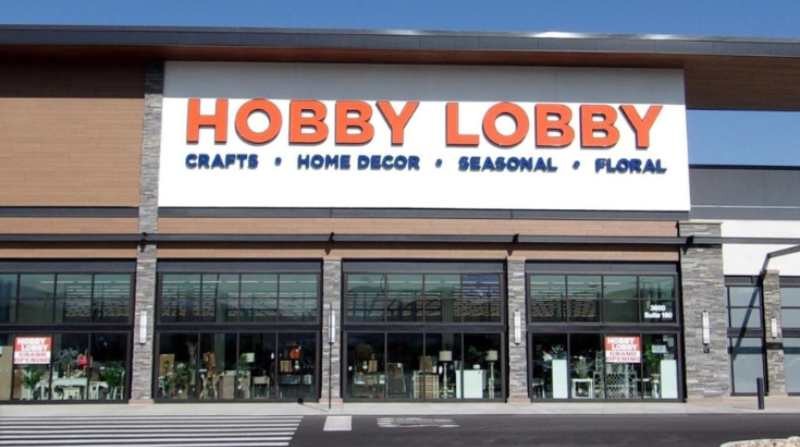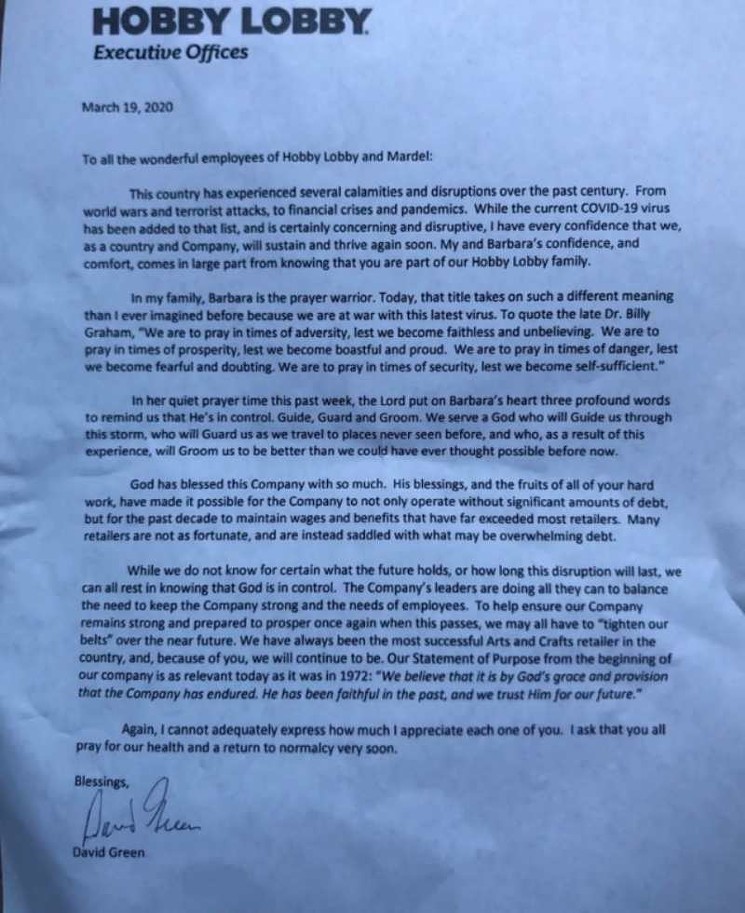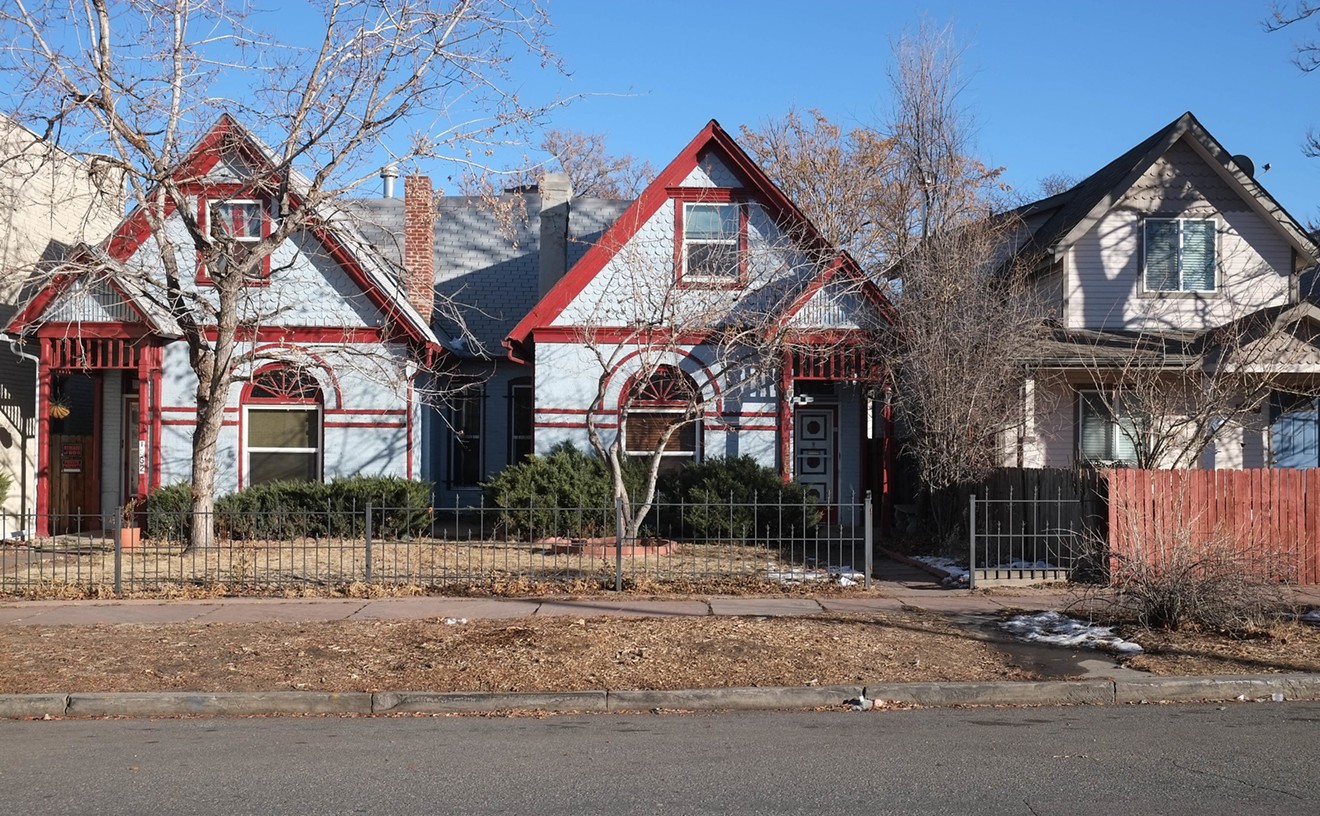Editor's note: After the publication of this post, Hobby Lobby stores in Colorado were ordered to shut their doors by the office of Attorney General Phil Weiser. Learn more in "Hobby Lobby Colorado Stores Told to Close After Defying COVID-19 Order." Continue for our previous coverage.
The vast majority of Colorado businesses not deemed essential under Governor Jared Polis's stay-at-home order have closed. But not the Hobby Lobby at 3600 Youngfield Street in Wheat Ridge, which has been open for business this week after being shuttered for several days.
Whether that will remain the case today, April 1, is unclear. An employee at the Wheat Ridge store told us she expected to be back on the job at 9 a.m. — and we didn't hear anything different from folks working at other Hobby Lobby stores that were open on March 31, including branches in Lakewood, Englewood, Lone Tree and Aurora. However, a staffer at the Westminster branch said he'd heard about other outlets in the chain being shut down. "We're just waiting for the paperwork," he said. "But we're open now."
The reluctance of Hobby Lobby stores to take a break from peddling craft items amid the global pandemic is among the odder business stories of the day, in part because of suggestions that the stance has supposedly been dictated by God.
Hobby Lobby CEO David Green is a proud Christian who's been described as "the largest evangelical benefactor in the world," thanks to a commitment to donate half of his pretax earnings to such causes. Moreover, he's not shy about defending his beliefs in the secular realm, as he did in the U.S. Supreme Court case Sibelius v. Hobby Lobby, which found the firm attacking the Affordable Care Act, aka Obamacare, over a requirement that it include birth-control coverage in the health insurance it provided to employees.
A number of fundamentalist organizations have defied COVID-19 closures — among them Liberty University in Virginia, where a stay-at-home order through June 10 was put in place this week. As for Hobby Lobby, the firm issued a March 17 press release that focused on enhanced efforts to keep customers and employees safe but made no mention of closures. Then, within days, a letter dated March 19 and ostensibly signed by Green began circulating on social media. It suggests a heavenly motivation for the stores to continue operating.
A key paragraph references Green's wife, Barbara: "In her quiet prayer time this past week, the Lord put on Barbara’s heart three profound words to remind us that He’s in control. Guide, Guard, and Groom. We serve a God who will Guide us through this storm, who will Guard us as we travel to places never seen before, and who, as a result of this experience, will Groom us to be better than we could have ever thought possible before now."
After receiving a copy of the letter, the fact-checking website Snopes published a post whose headline asked, "Is Hobby Lobby Refusing to Close Stores Because of a Message from God?" The inconclusive piece concedes that investigators couldn't definitively confirm that Green had written the letter; Hobby Lobby didn't respond to the site's inquiries (and neither has it replied to one submitted by Westword). But the Snopes post points out that the missive certainly echoes many of the beliefs that Green has publicly espoused in the past.
The Hobby Lobby policy has stirred controversy across the country. Some stores have closed when expressly ordered to do so, as recently happened in Oklahoma City, after the Oklahoma governor signed an executive memorandum the company couldn't ignore.
In Colorado, the public-health order issued as part of Polis's stay-at-home mandate includes a long list of so-called critical businesses authorized to remain open at this time. There are thirteen categories, not counting key government functions: "healthcare operations" (hospitals, clinics, blood banks); "critical infrastructure" (utilities, telecommunication and data centers, hotels); "critical manufacturing" (food-processing plants, first that produce computers, medical equipment and household paper products); "critical services" (trash collection, mail and shipping services); "news media" (television, radio, newspapers); "financial and professional institutions" (banks, credit unions); "providers of basic necessities to economically disadvantaged populations" (homeless shelters, food banks); "construction" (housing, skilled trades such as plumbers); "defense" (military organizations and support groups); "critical services necessary to maintain the safety, sanitation and critical operations of residences or other critical businesses" (police and fire departments); "vendors that provide critical services or products" (child care services, logistics and technology support); "educational institutions that provide critical services to students and the general public" (schools that provide meals for students); and "critical retail."
Grouped under this last umbrella are grocery stores, farm and produce stands, gas stations and convenience stores, restaurants and bars that offer takeout and delivery, marijuana dispensaries, liquor stores, firearms stores, hardware, farm supply and building material stores, and establishments that sell cleaning and personal-care products or items that support working from home. Asked if any of these entries is broad enough to encompass a certain craft store, CDPHE spokesperson Ian Dickson is unambiguous. "Hobby Lobby has not been deemed essential," he states.
Even so, an employee at the Wheat Ridge Hobby Lobby, which had been closed for several days, was told to report for work on March 30 because it had been "deemed an essential service."
Is Hobby Lobby breaking Colorado law by remaining open? Dickson answers that question indirectly in an email: "People with concerns about a public health order should first contact their local public health agency to report any concerns. Residents may also file a report with the Attorney General’s Office at [email protected] if local law enforcement or a local public-health agency is unresponsive."
Click to read the Colorado Department of Public Health and Environment's second amended public-health order outlining authorized businesses under the state's stay-at-home order.
[
{
"name": "Air - MediumRectangle - Inline Content - Mobile Display Size",
"component": "12017618",
"insertPoint": "2",
"requiredCountToDisplay": "2",
"watchElement": ".fdn-content-body",
"astAdList": [
{
"adType": "rectangle",
"displayTargets": "mobile"
}
]
},{
"name": "Editor Picks",
"component": "17242653",
"insertPoint": "4",
"requiredCountToDisplay": "1",
"watchElement": ".fdn-content-body",
"astAdList": [
{
"adType": "rectangle",
"displayTargets": "desktop|tablet"
},{
"adType": "rectangle",
"displayTargets": "desktop|tablet|mobile"
}
]
},{
"name": "Inline Links",
"component": "18838239",
"insertPoint": "8th",
"startingPoint": 8,
"requiredCountToDisplay": "7",
"maxInsertions": 25
},{
"name": "Air - MediumRectangle - Combo - Inline Content",
"component": "17261320",
"insertPoint": "8th",
"startingPoint": 8,
"requiredCountToDisplay": "7",
"maxInsertions": 25,
"watchElement": ".fdn-content-body",
"astAdList": [
{
"adType": "rectangle",
"displayTargets": "desktop|tablet"
},{
"adType": "rectangle",
"displayTargets": "desktop|tablet|mobile"
}
]
},{
"name": "Inline Links",
"component": "18838239",
"insertPoint": "8th",
"startingPoint": 12,
"requiredCountToDisplay": "11",
"maxInsertions": 25
},{
"name": "Air - Leaderboard Tower - Combo - Inline Content",
"component": "17261321",
"insertPoint": "8th",
"startingPoint": 12,
"requiredCountToDisplay": "11",
"maxInsertions": 25,
"watchElement": ".fdn-content-body",
"astAdList": [
{
"adType": "leaderboardInlineContent",
"displayTargets": "desktop|tablet"
},{
"adType": "tower",
"displayTargets": "mobile"
}
]
}
]













